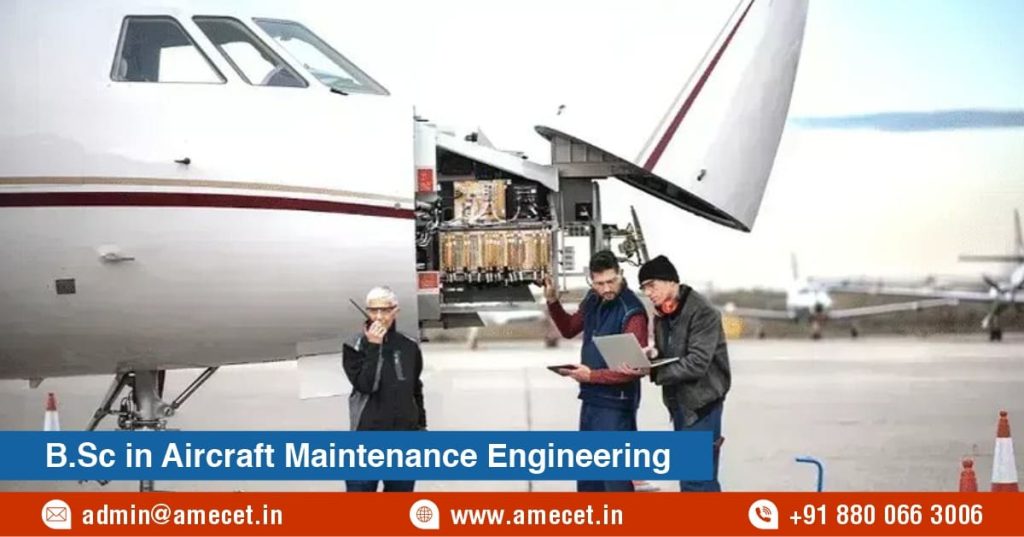Why Choose a B.Sc. in Aircraft Maintenance Engineering?
Posted on : 9 July, 2024 4:56 pm
Introduction
- Choosing a B.Sc. in Aircraft Maintenance Engineering is a strategic step towards a rewarding career in the aviation industry. This specialized degree equips students with the technical expertise and practical skills needed to maintain and repair aircraft, ensuring safety and efficiency. With the aviation sector’s continuous growth, there is a high demand for skilled aircraft maintenance engineers. The program offers a comprehensive curriculum that includes hands-on training and industry-relevant knowledge, preparing graduates for diverse roles in commercial, military, and private aviation. Pursuing this degree opens doors to a dynamic and impactful profession.
Key Skills Developed
- A B.Sc. in Aircraft Maintenance Engineering cultivates essential skills such as technical proficiency in aircraft systems, problem-solving, and attention to detail. Students learn to perform inspections, diagnostics, and repairs, ensuring aircraft safety and efficiency. The program also enhances communication and teamwork abilities, preparing graduates for collaborative work environments in the aviation industry.
Hands-On Training
- A B.Sc. in Aircraft Maintenance Engineering emphasizes hands-on training, providing students with practical experience in aircraft inspection, maintenance, and repair. Through internships, co-op programs, and laboratory work, students gain real-world skills working with advanced aircraft systems and tools. This practical exposure ensures graduates are well-prepared to meet the technical demands of the aviation industry and excel in their careers.
Industry Relevance
- A B.Sc. in Aircraft Maintenance Engineering aligns with industry standards, ensuring graduates are equipped with current knowledge and skills. The curriculum adapts to technological advancements, such as modern avionics and composite materials. This degree prepares students to meet the evolving demands of the aviation sector, making them valuable assets to airlines, maintenance organizations, and regulatory agencies.
Educational Benefits
- A B.Sc. in Aircraft Maintenance Engineering offers a comprehensive curriculum covering aircraft systems, avionics, and maintenance practices. Students gain theoretical knowledge and practical skills through hands-on training and internships. The program also provides opportunities for specialization in areas like propulsion or avionics, preparing graduates for diverse career paths and ensuring they meet industry standards and regulations.
Career Opportunities
- A B.Sc. in Aircraft Maintenance Engineering opens doors to various roles, such as aircraft maintenance engineer, avionics technician, and quality control inspector. Graduates can work in commercial airlines, defense organizations, and private aviation companies. The growing aviation industry ensures high demand for skilled professionals, offering job stability, competitive salaries, and opportunities for career advancement in diverse aviation sectors.
Professional Growth
- A B.Sc. in Aircraft Maintenance Engineering fosters continuous professional growth through advanced certifications and specialized training. Graduates can pursue licenses like the FAA’s A&P (Airframe and Powerplant) certification. Networking opportunities, industry conferences, and membership in professional organizations further enhance career development, ensuring graduates stay updated with industry trends and advancements, ultimately positioning them for leadership roles in the aviation sector.
Real-World Impact
- Graduates with a B.Sc. in Aircraft Maintenance Engineering play a critical role in ensuring aircraft safety and reliability. Their expertise in maintaining and repairing aircraft contributes to efficient airline operations, reduced downtime, and enhanced passenger safety. By upholding stringent industry standards, these professionals help minimize risks and improve the overall performance and sustainability of the aviation industry.
Conclusion
- Earning a B.Sc. in Aircraft Maintenance Engineering equips graduates with the specialized skills and knowledge necessary to thrive in the dynamic aviation industry. From technical proficiency and hands-on training to compliance with rigorous safety standards, this degree prepares individuals for pivotal roles in maintaining aircraft safety and operational efficiency. With diverse career opportunities in commercial airlines, defense sectors, and aviation maintenance firms, pursuing this degree ensures graduates embark on a rewarding career path with significant contributions to aviation safety and industry advancement.

